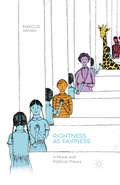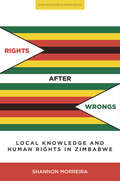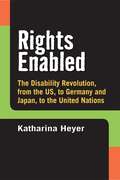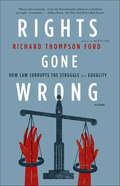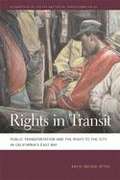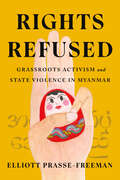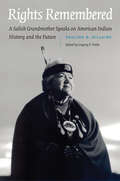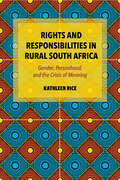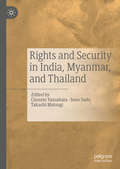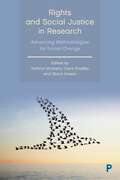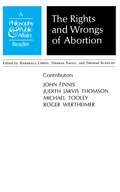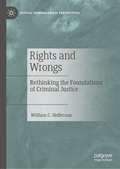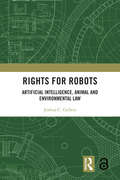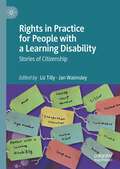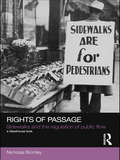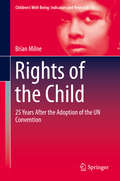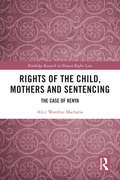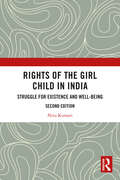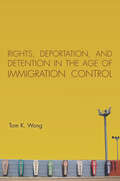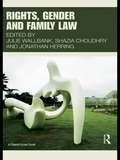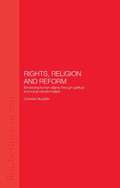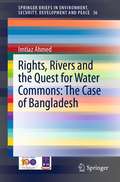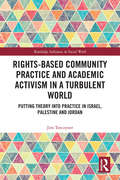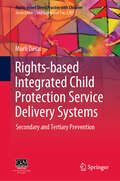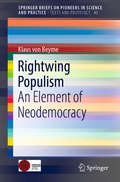- Table View
- List View
Rightness as Fairness: A Moral and Political Theory
by Marcus ArvanRightness as Fairness provides a uniquely fruitful method of 'principled fair negotiation' for resolving applied moral and political issues that requires merging principled debate with real-world negotiation.
Rights After Wrongs: Local Knowledge and Human Rights in Zimbabwe
by Shannon MorreiraThe international legal framework of human rights presents itself as universal. But rights do not exist as a mere framework; they are enacted, practiced, and debated in local contexts. Rights After Wrongs ethnographically explores the chasm between the ideals and the practice of human rights. Specifically, it shows where the sweeping colonial logics of Western law meets the lived experiences, accumulated histories, and humanitarian debts present in post-colonial Zimbabwe. Through a comprehensive survey of human rights scholarship, Shannon Morreira explores the ways in which the global framework of human rights is locally interpreted, constituted, and contested in Harare, Zimbabwe, and Musina and Cape Town, South Africa. Presenting the stories of those who lived through the violent struggles of the past decades, Morreira shows how supposedly universal ideals become localized in the context of post-colonial Southern Africa. Rights After Wrongs uncovers the disconnect between the ways human rights appear on paper and the ways in which it is possible for people to use and understand them in everyday life.
Rights Enabled: The Disability Revolution, From The Us, To Germany And Japan, To The United Nations
by Katharina C. HeyerDrawing on extensive fieldwork and a variety of original sources, Katharina Heyer examines three case studies--Germany, Japan, and the United Nations--to trace the evolution of a disability rights model from its origins in the U. S. through its adaptations in other democracies to its current formulation in international law. She demonstrates that, although notions of disability, equality, and rights are reinterpreted and contested within various political contexts, ultimately the result may be a more robust and substantive understanding of equality. Rights Enabled is a truly interdisciplinary work, combining sociolegal literature on rights and legal mobilization with a deep cultural and sociopolitical analysis of the concept of disability developed in Disability Studies. Heyer raises important issues for scholarship on comparative rights, the global reach of social movements, and the uses and limitations of rights-based activism.
Rights Gone Wrong: How Law Corrupts the Struggle for Equality
by Richard Thompson FordA New York Times Notable Book for 2011 Since the 1960s, ideas developed during the civil rights movement have been astonishingly successful in fighting overt discrimination and prejudice. But how successful are they at combating the whole spectrum of social injustice-including conditions that aren't directly caused by bigotry? How do they stand up to segregation, for instance-a legacy of racism, but not the direct result of ongoing discrimination? It's tempting to believe that civil rights litigation can combat these social ills as efficiently as it has fought blatant discrimination. In Rights Gone Wrong, Richard Thompson Ford, author of the New York Times Notable Book The Race Card, argues that this is seldom the case. Civil rights do too much and not enough: opportunists use them to get a competitive edge in schools and job markets, while special-interest groups use them to demand special privileges. Extremists on both the left and the right have hijacked civil rights for personal advantage. Worst of all, their theatrics have drawn attention away from more serious social injustices. Ford, a professor of law at Stanford University, shows us the many ways in which civil rights can go terribly wrong. He examines newsworthy lawsuits with shrewdness and humor, proving that the distinction between civil rights and personal entitlements is often anything but clear. Finally, he reveals how many of today's social injustices actually can't be remedied by civil rights law, and demands more creative and nuanced solutions. In order to live up to the legacy of the civil rights movement, we must renew our commitment to civil rights, and move beyond them.
Rights In Transit: Public Transportation And The Right To The City In California's East Bay
by Kafui Ablode Attoh Mathew Coleman Sapana DoshiIs public transportation a right? Should it be? For those reliant on public transit, the answer is invariably "yes" to both. Indeed, when city officials propose slashing service or raising fares, it is these riders who are often the first to appear at that officials' door demanding their "right" to more service. Rights in Transit starts from the presumption that such riders are justified. For those who lack other means of mobility, transit is a lifeline. It offers access to many of the entitlements we take as essential: food, employment, and democratic public life itself. While accepting transit as a right, this book also suggests that there remains a desperate need to think critically, both about what is meant by a right and about the types of rights at issue when public transportation is threatened. Drawing on a detailed case study of the various struggles that have come to define public transportation in California's East Bay, Rights in Transit offers a direct challenge to contemporary scholarship on transportation equity. Rather than focusing on civil rights alone, Rights in Transit argues for engaging the more radical notion of the right to the city.
Rights Refused: Grassroots Activism and State Violence in Myanmar (Stanford Studies in Human Rights)
by Elliott Prasse-FreemanFor decades, the outside world mostly knew Myanmar as the site of a valiant human rights struggle against an oppressive military regime, predominantly through the figure of Nobel Peace Prize winner Aung San Suu Kyi. And yet, a closer look at Burmese grassroots sentiments reveals a significant schism between elite human rights cosmopolitans and subaltern Burmese subjects maneuvering under brutal and negligent governance. While elites have endorsed human rights logics, subalterns are ambivalent, often going so far as to refuse rights themselves, seeing in them no more than empty promises. Such alternative perspectives became apparent during Burma's much-lauded decade-long "transition" from military rule that began in 2011, a period of massive change that saw an explosion of political and social activism. How then do people conduct politics when they lack the legally and symbolically stabilizing force of "rights" to guarantee their incursions against injustice? In this book, Elliott Prasse-Freeman documents grassroots political activists who advocate for workers and peasants across Burma, covering not only the so-called "democratic transition" from 2011-2021, but also the February 2021 military coup that ended that experiment and the ongoing mass uprising against it. Taking the reader from protest camps, to flop houses, to prisons, and presenting practices as varied as courtroom immolation, occult cursing ceremonies, and land reoccupations, Rights Refused shows how Burmese subaltern politics compel us to reconsider how rights frameworks operate everywhere.
Rights Remembered: A Salish Grandmother Speaks on American Indian History and the Future (American Indian Lives)
by Pauline R. Hillaire Gregory P. FieldsRights Remembered is a remarkable historical narrative and autobiography written by esteemed Lummi elder and culture bearer Pauline R. Hillaire, Scälla–Of the Killer Whale. A direct descendant of the immediate postcontact generation of Coast Salish in Washington State, Hillaire combines in her narrative life experiences, Lummi oral traditions preserved and passed on to her, and the written record of relationships between the United States and the indigenous peoples of the Northwest Coast to tell the story of settlers, government officials, treaties, reservations, and the colonial relationship between Coast Salish and the white newcomers. Hillaire’s autobiography, although written out of frustration with the status of Native peoples in America, is not an expression of anger but rather represents, in her own words, her hope “for greater justice for Indian people in America, and for reconciliation between Indian and non-Indian Americans, based on recognition of the truths of history.” Addressed to indigenous and non-Native peoples alike, this is a thoughtful call for understanding and mutual respect between cultures.
Rights and Responsibilities in Rural South Africa: Gender, Personhood, and the Crisis of Meaning
by Kathleen RiceRights and Responsibilities in Rural South Africa examines the gendered and generational conflicts surrounding social change in South Africa's rural Eastern Cape roughly twenty years after the end of Apartheid.In post-Apartheid South Africa, rights-based public discourse and state practices promote liberal, autonomous, and egalitarian notions of personhood, yet widespread unemployment and poverty demand that people rely closely on one another and forge relationships that disrupt the gendered and generational hierarchies framed as traditional and culturally authentic. Kathleen Rice examines the ways these tensions and restructurings lead to uncertainties about how South Africans should live together in their daily lives, with particular implications for understanding and responding to widespread gendered and sexual conflict and violence. Focusing particularly on the women of the village of Mhlambini, Rights and Responsibilities in Rural South Africa offers compelling portraits of how they experience and navigate widespread social and economic change and presents their experiences as a way of understanding how people navigate the moral ambiguities of contemporary South African life.
Rights and Security in India, Myanmar, and Thailand
by Sueo Sudo Chosein Yamahata Takashi MatsugiThis book is centred on the role of the triangular interactions among communities, educational sectors, and academic diplomacy in facilitating peaceful societal change by evaluating the common challenges in India, Myanmar, and Thailand. It analyses urban poverty, religious freedom, ethnic diversity, women’s rights, development and regional partnership, civil-military relations, and human security in democratic transition and explores in-depth the societal issues from local and international perspectives paying special attention to the protection of ‘rights’ and promotion of ‘security’ in these societies.The book highlights that the continuous application of knowledge across borders and the promotion of international norms are essential tools in enabling social transformations from the bottom. In addition, the contributors promote further discussion on both the process and the outcome from action research projects that shape the lives of the local people and their communities. The book therefore contributes to the existing literature by offering additional insights into the societies of India, Myanmar and Thailand for policy makers, social innovators, researchers, development analysts and planners and the general public including students.
Rights and Social Justice in Research: Advancing Methodologies for Social Change
by Kathryn McGarry, Ciara Bradley and Gloria KirwanCan our research create conditions for people to flourish? What kinds of questions do we ask about the social world and how knowledge is produced? Does our approach to research itself matter? This edited collection explores and illustrates the nature of research for social justice. Drawing on a diverse range of social research projects, it examines research with and for young people, marginalised communities and those who work to further social justice and human rights goals. Providing key examples of the tools, processes and outcomes of research relevant to social justice, including where and how these frameworks can be used in the design and execution of research, this is a much-needed intervention to social research methodology.
Rights and Wrongs of Abortion: A Philosophy and Public Affairs Reader (Philosophy and Public Affairs Readers #1)
by Marshall Cohen, Thomas Nagel & Thomas ScanlonDuring its first two years of publication, Philosophy & Public Affairs contributed to the public debate on abortion a set of remarkable and brilliant articles which examine the basic philosophical issues posed by this controversial subject: whether the fetus is a person, whether it has a right to life, whether a woman has a right to decide what happens in and to her body, whether there is an ethical connection between abortion and infanticide, whether there is any point after conception where it is possible to draw the line beyond which killing is impermissible. These five essays, together here for the first time in a single volume, offer radically differing points of view; they provide the best sustained discussion of these philosophical issues available anywhere.Contents: Judith Jarvis Thomson, "A Defense of Abortion"; Roger Wertheimer, "Understanding the Abortion Argument"; Michael Tooley, "Abortion and Infanticide"; John Finnis, "The Rights and Wrongs of Abortion"; and Judith Jarvis Thomson, "Rights and Deaths."
Rights and Wrongs: Rethinking the Foundations of Criminal Justice (Critical Criminological Perspectives)
by William C. HeffernanThis book seeks to explain why the concept of justice is critical to the study of criminal justice. Heffernan makes such a case by treating state-sponsored punishment as the defining feature of criminal justice. In particular, this work accounts for the state’s role as a surrogate for victims of wrongdoing, and so makes it possible to integrate victimology scholarship into its justice-based framework. In arguing that punishment may be imposed only for wrongdoing, the book proposes a criterion for repudiating the legal paternalism that informs drug-possession laws. Rethinking the Foundations of Criminal Justice outlines steps for taming the state’s power to punish offenders; in particular, it draws on restorative justice research to outline possibilities for a penology that emphasizes offenders’ humanity. Through its examination of equality issues, the book integrates recent work on the social justice/criminal justice connection into the scholarly literature on punishment, and so will particularly appeal to those interested in criminal justice theory.
Rights for Robots: Artificial Intelligence, Animal and Environmental Law
by Joshua C. GellersBringing a unique perspective to the burgeoning ethical and legal issues surrounding the presence of artificial intelligence in our daily lives, the book uses theory and practice on animal rights and the rights of nature to assess the status of robots. Through extensive philosophical and legal analyses, the book explores how rights can be applied to nonhuman entities. This task is completed by developing a framework useful for determining the kinds of personhood for which a nonhuman entity might be eligible, and a critical environmental ethic that extends moral and legal consideration to nonhumans. The framework and ethic are then applied to two hypothetical situations involving real-world technology—animal-like robot companions and humanoid sex robots. Additionally, the book approaches the subject from multiple perspectives, providing a comparative study of legal cases on animal rights and the rights of nature from around the world and insights from structured interviews with leading experts in the field of robotics. Ending with a call to rethink the concept of rights in the Anthropocene, suggestions for further research are made. An essential read for scholars and students interested in robot, animal and environmental law, as well as those interested in technology more generally, the book is a ground-breaking study of an increasingly relevant topic, as robots become ubiquitous in modern society.
Rights in Practice for People with a Learning Disability: Stories of Citizenship
by Liz Tilly Jan WalmsleyThis book aims to raise awareness about the possibility of achieving the goals of the United Nations Convention on the Rights of Persons with Disabilities (UNCRPD), in order for all disabled people to enjoy the benefit of human rights. The stories of people who have been supported to enjoy their rights and their citizenship will enable readers to focus on how services and support can enable people with a learning disability to have their rights upheld, with an outcome of citizenship, independence and achievement. Despite the UNCRDP being in place since 2006, a significant number of learning disability service provider organisations and professionals in the UK are not aware of its existence. This book aims to bridge the gap between policy and practice to demonstrate the value of a human rights approach as the foundation for services and support for people with a learning disability.
Rights of Passage: Sidewalks and the Regulation of Public Flow (Social Justice)
by Nicholas BlomleyRights of Passage: Sidewalks and the Regulation of Public Flow documents a powerful and under-researched form of urban governance that focuses on pedestrian flow. This logic, which Nicholas Blomley terms 'pedestrianism', values public space not in terms of its aesthetic merits, or its success in promoting public citizenship and democracy. Rather, the function of the sidewalk is understood to be the promotion and facilitation of pedestrian flow and circulation, predicated on the appropriate arrangement of people and objects. This remarkably pervasive yet overlooked logic shapes the ways in which public space is regulated, conceived of, and argued about. Rights of Passage shows how the sidewalk is literally produced, encoded, rendered legible and operational with reference to a dense array of codes, diagrams, specifications, academic and professional networks, engineering rubrics, regulation and case law – all in the name of unfettered circulation. Although a powerful form of governance, pedestrianism tends to be obscured by grander and more visible forms of urban regulation. The rationality at work here may appear commonplace; but, precisely because it is uncontroversial, pedestrianism is able to operate below the academic and political radar. Complicating the prevailing tendency to focus on the socially directive nature of public space regulation, Blomley reveals the particular ways in which pedestrianism deactivates rights-based claims to public space.
Rights of the Child
by Brian MilneThis work reviews the progress of children's rights 25 years since the adoption of the UN Convention on the Rights of the Child. It studies the progress of that human rights instrument as part of an ongoing process. It examines how recent past, present and future generations will benefit or suffer as part of the process in which outcomes cannot be predicted. It does not project into the future. Its emphasis is on a review of the period after 1989 and it comments on what has happened and offering guidance on how children's rights might progress. The book presents a realistic but not always critical review of two and a half decades of intensive activity in the field of children's rights worldwide. It includes both failures and examples of good practice and positive experiences. It offers a review of progress and lack of progress in child rights and welfare in the twelve countries used as case studies in its predecessor, The Next Generation. Finally, the volume considers the impact of current geopolitical and economic realities on children's rights in the early years of the twenty-first century. The book is a tribute to Judith Ennew and pays homage to all of the people who have contributed so much to children's rights over the years and wishes to encourage others to take up the cause.
Rights of the Child, Mothers and Sentencing: The Case of Kenya (Routledge Research in Human Rights Law)
by Alice Wambui MachariaThis book draws international attention to the autonomy of the child accompanying incarcerated mothers, and those they leave behind in the community, despite being dependent on the convicted caregiver. Adopting a child rights perspective, the study explores how courts could go about sentencing mothers of young children for the commission of criminal offences, whilst protecting the rights of the child as envisaged under the United Nations Convention on the Rights of the Child (UNCRC). Drawing on the author’s experience as a sentencer in the Kenyan court and with reference to domestic, regional and international law, the book argues that children’s rights are presently left in abeyance when their mothers are sentenced to imprisonment, and that greater efforts should be made to recognize and give effect to the child’s existence as an autonomous equal holder of human rights, despite being dependent on the convicted caregiver. It explores the application of precedence as well as the court’s discretion in view of the dependent child, and concludes that policy reform in this respect calls for change in attitude and approach on women and children’s issues. Observing that internationally, most women imprisoned with their children fall beneath the custodial threshold set by law, the research examines how current sentencing practices could be reformed, and suggests harnessing the Power of Mercy Committee, the Sentencing Guidelines and progressive practices from developed countries in protecting the child’s rights by imposing non-custodial sentences for the offending mothers. It is concluded that in all jurisdictions, strict accountability for the dependent child should be situated with the judiciary, and that the same should be pronounced as a mandatory legal requirement. The book will be a valuable resource for academic, researchers and policy-makers working in the area of international children’s rights law and criminal law.
Rights of the Girl Child in India: Struggle for Existence and Well-Being
by Nitu KumariThis book discusses regional and global discourses on the rights of children, especially girls. It focuses on social and government initiatives to address the marginalization of women and girls in societies across the world.It traces the root causes for the vulnerable positions of girls and women and the challenges associated with improving their access to opportunities, education, healthcare and socio-economic freedoms. It explores national and international initiatives for the welfare and development of the girl child and recent social, legal and policy developments towards uplifting vulnerable girls in largely patriarchal societies in India. It looks at debates over age and rights; the status of the girl child; the causes and consequences of being vulnerable; various aspects of welfare and protection and the cultural relativism and violation of human rights of girls and women.An important volume on human rights, this book will be of interest to students, researchers and practitioners of gender studies, sociology of the family, human rights, law and civil liberties, development studies, socio-legal studies, and sociology and social policy.
Rights, Deportation, and Detention in the Age of Immigration Control
by Tom K. WongImmigration is among the most prominent, enduring, and contentious features of our globalized world. Yet, there is little systematic, cross-national research on why countries "do what they do" when it comes to their immigration policies. Rights, Deportation, and Detention in the Age of Immigration Control addresses this gap by examining what are arguably the most contested and dynamic immigration policies--immigration control--across 25 immigrant-receiving countries, including the U. S. and most of the European Union. The book addresses head on three of the most salient aspects of immigration control: the denial of rights to non-citizens, their physical removal and exclusion from the polity through deportation, and their deprivation of liberty and freedom of movement in immigration detention. In addition to answering the question of why states do what they do, the book describes contemporary trends in what Tom K. Wong refers to as the machinery of immigration control, analyzes the determinants of these trends using a combination of quantitative analysis and fieldwork, and explores whether efforts to deter unwanted immigration are actually working.
Rights, Gender and Family Law
by Jonathan Herring Julie Wallbank Shazia ChoudhryThere has been a widespread resurgence of rights talk in social and legal discourses pertaining to the regulation of family life, as well as an increase in the use of rights in family law cases, in the UK, the US, Canada and Australia. Rights, Gender and Family Law addresses the implications of these developments – and, in particular, the impact of rights-based approaches upon the idea of welfare and its practical application. There are now many areas of family law in which rights and welfare based approaches have been forced together. But whilst, to many, they are premised upon different ethics – respectively, of justice and of care – for others, they can nevertheless be reconciled. In this respect, a central concern is the 'gender-blind' character of rights-based approaches, and the ontological and practical consequences of their employment in the gendered context of the family. Rights, Gender and Family Law explores the tensions between rights-based and welfare-based approaches: explaining their differences and connections; considering whether, if at all, they are reconcilable; and addressing the extent to which they can advantage or disadvantage the interests of women, children and men. It may be that rights-based discourses will dominate family law, at least in the way that social policy and legislation respond to calls of equality of rights between mothers and fathers. This collection, however, argues that rights cannot be given centre-stage without thinking through the ramifications for gendered power-relations, and the welfare of children. It will be of interest to researchers and scholars working in the fields of family law, gender studies and social welfare.
Rights, Religion and Reform: Enhancing Human Dignity through Spiritual and Moral Transformation
by Chandra MuzaffarThis book discusses issues concerning human rights and religion. Is a more integrated approach to human rights desirable - an approach that transcends the individual-centred orientation of civil and political liberties of the dominant centres of power in the West? How can religious thought contribute to an integrated notion of human rights and human dignity? What sort of transformation should religion itself undergo in order to enable it to come to grips with contemporary challenges? Related to this is a larger question: How can universal spiritual and moral values help to shape politics, the economy and society as a whole?
Rights, Rivers and the Quest for Water Commons: The Case of Bangladesh (SpringerBriefs in Environment, Security, Development and Peace #36)
by Imtiaz AhmedRight to water may sound novel and somewhat dramatic, yet it has been central to the quest of human civilization for thousands of years. One of the earliest references to water as ‘common property’ can be found in the Jewish laws as early as 3000 BCE.Similar views are also found in Islam. In fact, the Arabic word for Islamic law - shari’ah - originally meant “the place from which one descends to water.”Since water is a gift from the divine to all living beings, sharing water is regarded as holy duty. This is found across religions, regions, societies, and communities, from New Zealand to Nigeria, from Bangladesh to Brazil. But then, what transformed the divine sanction? What led to the negation of the ‘commons,’ with sharing of the riverine water across territorial boundaries suffering the most?The answer probably lies as much as in the politics of safeguarding one’s personal or national interests as it is in the limitations imposed by our disciplinary understanding of things.In this context, a thorough reexamination, even reconceptualization,of some of the core issuesis required.Firstly, the concept of water needs to be understood not as H2O, as it is done in physical sciences,but as H2OP4. That is, the meaning of water in social sciences must include not only ‘twice hydrogen plus oxygen’ but also four P’s - pollution, power, politics and profit. This is not to discount the ‘science’ in the conceptualization of water but rather to add elements central to social sciences.Secondly, the concept of river needs to be redefined and understood not as a carrier of water, as assumedin most of theWestern languages, but as ‘nadi,’ a flow consisting of prana (life), shakti (power), and atman (soul), as etymologically definedin most of the South Asian languages. This comes closer to what critical hydrologists would say, WEBS, that is, a ‘river’ consists of water, energy, biodiversity and sediment. In this light, any fragmentation of transboundary river waterin the name of ‘sharing’becomes an unworkable option, unless of course a mechanism is found to ‘share’the water of the river along with its energy, biodiversity and sediment, and that again, without distorting and harming the life of the river!Thirdly, the subject of ‘water commons’needs to be approached from the standpoint of ‘rights’ of both human andriver. This is to flag the notion that nature, including rivers, has ‘rights’just like humans, although their manifestations may be different. In fact, empowered humans, particularly those in control of the state, have more ‘responsibility’ than ‘rights’ in dissuading themselves and others from creating conditions of human wrongs, not only against fellow human beings but also against nature.Finally, if the ‘rights’ ofhumans are to be ensuredthen there is an urgent need to reconceptualize and mainstream the human as a multiverse being. This is because humans are not only political beings but also economic, cultural, ecological, technological, and psychological beings. In this light, if conflicts are to be contained then humans need to be empowered in all possible areasof life – politics, economics, ecology, culture, technology, and psychology. This would certainly require empowering each and every person, all at the same time receptive to nature in general and rivers in particular.The book is designed to initiate a discourse on the civilizational quest for water commons, indeed, with the expectation that a discussion on rights and rivers would lead to a creative flow of ideas and practices.
Rights-Based Community Practice and Academic Activism in a Turbulent World: Putting Theory into Practice in Israel, Palestine and Jordan (Routledge Advances in Social Work)
by Jim TorczynerDrawing on a theoretical model of coexistence premised on universality, reciprocity and inclusion, this book focusses on the development of academic social work programs and cross-border partnerships to promote social justice and peace in Israel, Palestine, and Jordan. Using the model of rights-based practice initiated by Professor Torczyner in Montreal and brought to the Middle East in the 1990s, it shows how the creation and brokering of cross-border partnerships added the concept of rights-based practice to the lexicon of these countries, established groundbreaking advocacy centers in the hearts of disadvantaged communities, developed academic social work programs, and initiated important policy changes in each country to reduce inequality and promote social inclusion. Showing how this evolving method of rights-based practice rooted in theories of coexistence was uniquely adapted in different contexts and cultures while negotiating complex, volatile political environments, it illustrates how long-term peace can be advanced when like-minded people —irrespective of nationality or religion—find ways to promote common interest and a regional culture where all people share the same rights. This book will be of interest to all social work students and practitioners interested in community organization and rights-based practice, as well as scholars, policy makers and practitioners of international development, political science, peace studies, Jewish studies, Middle Eastern studies, reconciliation, and conflict resolution.
Rights-based Integrated Child Protection Service Delivery Systems: Secondary and Tertiary Prevention (Rights-based Direct Practice with Children)
by Murli DesaiThe Sourcebook-IV provides training modules for rights-based integrated child protection service delivery systems at the secondary and tertiary prevention levels. Part 1 of the Sourcebook focuses on the preventative, comprehensive, integrated and systemic, and universal community-based and family-based service delivery systems for children; and the methods of case management and outcomes-based project cycle. Part 2 discusses children and families at risk and the role of community-based Integrated Childcare and Support Centres for providing supplementary care and support services to them at the secondary prevention level. It also focuses on children facing sociolegal problems such as deprivation of parental care, violence, and conflict with law, and the role of District-based Integrated Child Protection Centres for providing protection, justice and rehabilitation to them at the tertiary prevention level. Part 3 focuses on children in emergencies in general and in specific situations and role of Integrated Child Protection Centres in these situations. This is a necessary read for social workers, lawyers, researchers, trainers and teachers working on child rights across the world, and especially in developing countries.
Rightwing Populism: An Element of Neodemocracy (SpringerBriefs on Pioneers in Science and Practice #40)
by Klaus Von BeymeThis book, written by a prominent German political scientist and specialist for political theory and comparative government, analyses right-wing populism as a topical theme of postmodern party systems in Europe and the United States.
